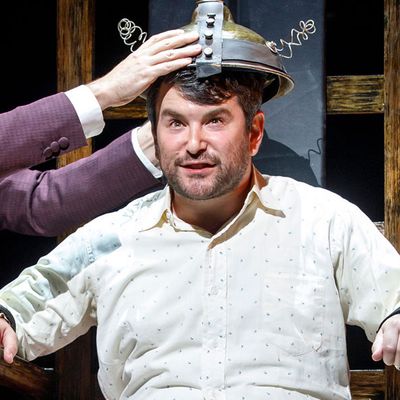
A few weeks ago, the inclusion of a Trump-like Caesar in Shakespeare in the Park’s production of Julius Caesar whipped some on the right to an indignant froth. The claim was that the production, by staging a 400-year-old assassination scene with a Trump stand-in, was encouraging violence toward our current president. This week, City Center’s Encores! Off-Center series is producing Assassins, the Stephen Sondheim–John Weidman musical about presidential shooters that features as its fourth line, “Come here and kill a president.” (It’s up through Saturday.) It seems like a good idea to clarify a point in advance: Assassins does not condone assassination (and there is no Trump figure). Instead, by staring down people we’d like to write off as sociopathic monsters, it provides a glimpse at a flaw built into the very DNA of our culture, and a loophole in the American dream that can only beget more violence. And in so doing, it is exactly the piece of theater we need to see right now.
First staged in 1990, Assassins has itself always been a bit of an outsider. Almost unique in its structure (each assassin gets a song in the style of his or her time, and between the songs they interact with each other in a sort of limbo), the show paints portraits of a handful of real people throughout time, all of whom made the horrific choice to kill, or attempt to kill, an American president. Why they do so is different in each case, and most are either bizarrely misguided (John Hinckley Jr. tried to kill Ronald Reagan in order to win the love of actress Jodie Foster), almost comically random (Giuseppe Zangara shot at FDR because he had stomach pains and blamed Hoover for them, but it was too cold to go where Hoover was; Sara Jane Moore went after Gerald Ford for … well, we’re never really sure why), or symbolic rather than personal (the radical Leon Czolgosz saw William McKinley as the embodiment of wealth inequality). Only John Wilkes Booth presents specific political grievances that he feels he must address with a bullet.
Portrayed as pathetic, sometimes comically deluded misfits on their own, as a group they become the symbol of a much larger problem in our country. Each of the assassins feels that he or she has been promised the dream that if only you work hard enough, you too can succeed and become rich and famous. But this isn’t always possible, and it hasn’t been for these characters. In a song toward the end of the show, the narrator character (who acts as a voice of reason and the audience’s stand-in) engages with the assassins, answering their desperation with the shiny promise of a rags-to-riches America that feels foolish against the reality of their lonely, disenfranchised lives — the America where the mailman wins the lottery, and the usherette becomes a rock star, and “normal” people win big by working hard. But the assassins overwhelm his cheery narrative with another melody: a twisted, off-kilter version of a patriotic ballad. They become the singers of “another national anthem” — one for the losers, the outsiders, and the angry people who feel they have been denied the prize they were promised. As we watch them, we begin to become aware that these twisted outsiders have found a terrifying catch in the American dream: When the riches and success don’t come through, what can make you famous is violence. In the final scene of the musical, John Wilkes Booth quotes Death of a Salesman — another great play about American disillusionment — when he says to Lee Harvey Oswald that “attention must be paid” to the lost, the struggling, and the disenfranchised. The only way that these characters see to achieving that attention is by committing an unthinkable act that will ensure they are remembered. Despised, but remembered.
These acts are not as unthinkable as they seem up on that stage. They play out on the world’s stage with every mass shooting or attack by someone who thinks that the fairest payback for his or her own pain is to cause suffering on a massive scale. Every time I see another one of these incidents, I think of Assassins. Because more than the guns and the inadequate mental-health resources (both of which are big problems), we have a country that is built on a promise that cannot always be kept. Those who feel cheated of the success they’re owed are going to keep realizing that violence can at least get you fame. And in our world, where the president is a reality-TV star, fame is power. Fame is everything.
As evidenced by the reaction to Julius Caesar, we do not live in a time that values provocative political art. But it is times like these that we are most in need of it. Theater can force us to confront and examine the darkest parts of ourselves in the confines of a dark room, in the safety of what is essentially make believe. It can show us people whose actions seem monstrous and put us temporarily in their shoes, so that we might understand their motives. It is only by facing these people and experiencing this radical empathy that we can hope to change. There’s a line early in Assassins, “tell them till they listen.” We could plug our ears at art that might shock and offend us, that tells us what we don’t want to hear. Or we could listen.

